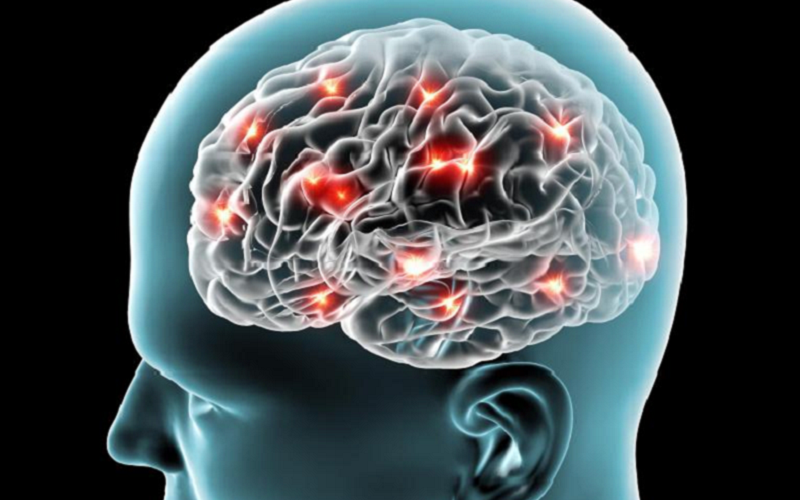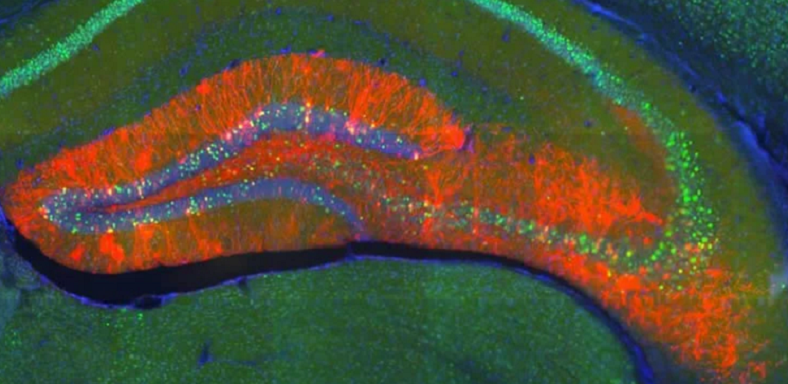
Nestled within the complex structure of the hippocampus, the Dentate Gyrus is a lesser-known yet crucial area of our brain that plays a pivotal role in how we navigate daily life. From the encoding of memories to the regulation of our emotions, the Dentate Gyrus is a central player in the intricate ballet of cognitive functions. Here we explore its crucial role in memory formation, emotional regulation, and the fascinating process of neurogenesis — the birth of new neurons, even in adulthood.
Contents
Understanding the Dentate Gyrus
The Dentate Gyrus, a key component of the hippocampal formation, is a critical area in our brain that often doesn’t get as much attention as it deserves.
Location and Structure of the Dentate Gyrus
The Dentate Gyrus is situated in the hippocampus, an area of the brain that is deeply involved in memory formation and spatial navigation. This brain region has a unique, curved structure that resembles a toothed, serrated edge, which is how it gets its name – ‘dentate’ meaning tooth-like.
It comprises granule cells, which are densely packed neurons that play a significant role in the processing of information. The positioning of the Dentate Gyrus within the hippocampus is crucial, as it forms a part of the hippocampal circuit – a pathway through which data flows for processing and memory formation.
Basic Functions of the Dentate Gyrus
The fundamental role of the Dentate Gyrus is in cognitive processes, primarily in the formation and retrieval of memories. It acts as a gateway for information before it gets processed in other parts of the hippocampus. This area of the brain is involved in the differentiation of similar experiences or patterns, a process known as pattern separation. This function is essential for distinguishing between similar memories and experiences, preventing them from being conflated.
The Dentate Gyrus contributes to spatial memory and navigation. It helps in creating mental maps of our environment, allowing us to navigate and recognize familiar and new spaces. This aspect is crucial for everyday tasks such as finding your way in a city or even locating an item in a supermarket.
The Dentate Gyrus and Memory Formation
The Dentate Gyrus is not just an anatomical feature of interest; it is a key player in the realm of memory formation. Its unique structure and function enable us to encode, store, and retrieve memories, which are integral to our daily experiences and learning processes.
Role of the Dentate Gyrus in Encoding Memories
One of the primary functions of the Dentate Gyrus is the encoding of new memories. This process involves converting daily experiences and information into a stored format that can be retrieved later. The granule cells in the Dentate Gyrus are actively involved in this process, receiving inputs from different parts of the brain and initiating the first step in the memory formation process.
They act as filters, ensuring that only relevant and significant information passes through to the next stages of memory processing in the hippocampus. This selective encoding is crucial for avoiding the overload of the memory system and helps in forming distinct and clear memories [1].
Impact of the Dentate Gyrus on Long-Term Memory
The role of the Dentate Gyrus extends beyond the initial encoding of memories. It also plays a significant part in the consolidation and stabilization of long-term memories. After initial encoding, memories are not immediately stable; they undergo a process of consolidation, where they are gradually integrated into the brain’s long-term storage.
The Dentate Gyrus, through its connections with other hippocampal regions, facilitates this process. It helps in organizing and structuring memories in a way that makes them easier to retrieve later. This function is vital for learning new skills, retaining information over time, and forming lasting personal memories.
Recent Research Findings Involving the Dentate Gyrus
Recent research has shed more light on the complexity of the Dentate Gyrus’s role in memory formation. Studies have found that this region is not only involved in the encoding and consolidation of memories but also in their retrieval. The Dentate Gyrus appears to help in distinguishing between similar memories, a process termed as ‘pattern separation’.
This ability prevents confusion and ensures the accuracy of memory recall. Additionally, research has suggested that the health and functionality of the Dentate Gyrus are critical in preventing memory-related diseases, such as Alzheimer’s, further underscoring its importance in our cognitive health [2].

The Dentate Gyrus in Emotional Regulation
The Dentate Gyrus’s influence extends beyond cognitive functions like memory and learning; it also plays a significant role in emotional regulation. This aspect of its functionality is pivotal for maintaining mental health and well-being.
Dentate Gyrus Connection to Emotional Responses
The Dentate Gyrus has intricate connections with various parts of the brain involved in emotional processing, such as the amygdala and the prefrontal cortex. These connections enable it to influence our emotional responses. The granule cells within the Dentate Gyrus are involved in modulating the activity of these emotional centers, aiding in the regulation of responses to emotional stimuli.
For example, when faced with a stressful situation, the Dentate Gyrus helps in modulating the stress response, preventing an overreaction and aiding in a more balanced emotional response. This modulation is crucial for emotional resilience and coping strategies in daily life.
Influence of Dentate Gyrus on Mood and Stress
The Dentate Gyrus also plays a role in the regulation of mood and the management of stress. It is involved in the production of new neurons, a process known as neurogenesis, which is believed to be linked with mood regulation. Research has shown that reduced neurogenesis in the Dentate Gyrus can lead to symptoms of depression and anxiety [3].
Conversely, activities that promote neurogenesis, such as physical exercise and certain pharmacological treatments, have been found to improve mood and reduce symptoms of depression. Additionally, the Dentate Gyrus’s role in stress management is evident through its interaction with the body’s stress response system, helping to regulate the hormonal responses to stress and mitigate its impact on the body and mind.

Neurogenesis in the Dentate Gyrus
A remarkable aspect of the Dentate Gyrus is its ability to undergo neurogenesis — the process of generating new neurons. This ability is rare in the adult brain, making the Dentate Gyrus a unique and vital area for ongoing brain development and plasticity.
Dentate Gyrus Role in the Process of Neurogenesis
Neurogenesis in the Dentate Gyrus involves the birth of new neurons from neural stem cells. These new neurons then integrate into the existing neural circuits, contributing to cognitive functions such as learning and memory. This process is influenced by various factors, including environmental stimuli, physical activity, and even stress levels. The new neurons formed in the Dentate Gyrus are particularly important for the formation of new memories and the flexibility of cognitive processes, allowing the brain to adapt and respond to new information and experiences effectively [4].
Significance of the Dentate Gyrus in Adult Brain Health
The ongoing neurogenesis in the Dentate Gyrus is significant for adult brain health. It is associated with improved cognitive functions, especially in learning and memory. The ability of the Dentate Gyrus to continuously generate new neurons provides the brain with a mechanism for renewal and repair, which is crucial for maintaining cognitive abilities as we age. Furthermore, a reduction in neurogenesis in this region has been linked with cognitive decline and the development of neuropsychiatric disorders, highlighting the importance of maintaining this neurogenic capacity.
Dentate Gyrus Factors Affecting Neurogenesis
Various factors can influence the rate and effectiveness of neurogenesis in the Dentate Gyrus. Lifestyle choices such as diet, exercise, and mental stimulation play a significant role. For instance, physical activity has been shown to enhance neurogenesis, improving cognitive functions and potentially providing a protective effect against cognitive decline.
Similarly, cognitive challenges and learning new skills can stimulate neurogenesis and bolster brain health. On the other hand, chronic stress and aging can negatively impact this process, leading to a decline in the production of new neurons and potentially contributing to cognitive impairments.
Dentate Gyrus Dysfunction and Neurological Disorders
The health and functionality of the Dentate Gyrus are not only vital for normal cognitive and emotional processes but also play a significant role in various neurological disorders. Dysfunction in this region of the brain can have far-reaching implications, affecting memory, mood, and overall brain health.
Dentate Gyrus Link to Cognitive Decline and Dementia
One of the major concerns related to Dentate Gyrus dysfunction is its connection to cognitive decline and dementia. Research has indicated that changes in the structure and function of the Dentate Gyrus are associated with age-related cognitive decline. In conditions like Alzheimer’s disease, the Dentate Gyrus often shows early signs of deterioration [5].
This deterioration can lead to impairments in memory formation and retrieval, which are hallmark symptoms of dementia. The role of the Dentate Gyrus in neurogenesis is also crucial here, as a reduction in the generation of new neurons is linked to decreased cognitive flexibility and memory capacity, exacerbating the symptoms of cognitive decline.
Dentate Gyrus Association with Mental Health Issues
The Dentate Gyrus is also implicated in various mental health conditions. Disorders such as depression, anxiety, and stress-related conditions have been linked to abnormalities in the Dentate Gyrus, particularly in its role in neurogenesis and emotional regulation.
Reduced neurogenesis in this region can lead to symptoms of depression and anxiety, suggesting that the health of the Dentate Gyrus is integral to emotional well-being. This connection has spurred interest in developing treatments that target the Dentate Gyrus to alleviate symptoms of these mental health conditions.
Current Research on Preventative Strategies for Dentate Gyrus Dysfunction
Given the significant role of the Dentate Gyrus in both cognitive and emotional health, current research is increasingly focused on developing preventative strategies and treatments for conditions associated with its dysfunction.
This includes exploring pharmacological treatments that can enhance neurogenesis or protect the Dentate Gyrus from age-related decline. Additionally, lifestyle interventions, such as exercise, diet, and cognitive training, are being studied for their potential to preserve the health of the Dentate Gyrus and prevent cognitive and emotional disorders.
References
[1] The dentate gyrus: fundamental neuroanatomical organization
[2] Neurogenesis in the dentate gyrus: carrying the message or dictating the tone
[3] Dentate gyrus
[4] Assessments of dentate gyrus function: discoveries and debates
[5] Moderate effect of early-life experience on dentate gyrus function

